#in my favor!!!
Text
Guys I feel like all my dreams just came true tonight this is great omg
5 notes
·
View notes
Text
i LOVE IT WHEN REDEEMABLE CHARACTERS RELAPSE INTO THEIR OLD WAYS!!! WHEN THEY GO BACK TO THE DARK SIDE!!! TO THE FEIGNED COMFORT OF WHEN THINGS FELT GOOD!! BUT THEY LEARNED SO MANY THINGS ABOUT THEMSELVES THAT THE OLD PLACE DOESN'T TRULY FEEL AT HOME EITHER, BUT IT'S THE ONLY PLACE TO RUN TO!!!! HELLLL YEAH
#this is abt zuko obviously#but also. blackbeard ofmd. there's more examples but im hyperfixated on these silly gay shows rn#EDIT: CAN'T BELIEVE I FORGOT ABOUT SCOTT FAVOR#MY GUY!!!!!!
26K notes
·
View notes
Text
i know it’s like years old at this point but i love that one collab mumbo and grian did with tommyinnit bc it’s like the single most concentrated example i’ve seen of mumbo’s Chaos Nullification Powers
you get to see a bit of it on hermitcraft, mostly via his interactions with grian, but until seeing that collab it didn’t really hit me just how completely mumbo can no-sell other people’s attempts to control a situation. tommyinnit is possibly the single shoutiest, most chaotic minecraft youtuber out there, and in most videos i’ve seen he pretty much overwhelms everyone else and sets the tone for interactions because of this. but mumbo just. doesn’t let him. no matter how much tommy escalates in intensity, mumbo reacts with *exactly* the same energy he always does. grian largely comes across in the whole video as annoyed and reluctant to engage with the whole thing, but mumbo’s not even affected. he just rolls with anything he finds funny and basically ignores anything he disapproves of, only seeming more and more unflappable the harder anyone tries to get a rise out of him.
AND imo, this is the key to my favorite interpretation of him as a character
see, when the people around him are being more reasonable/calm, i think mumbo often comes across as anxious and a bit easily overwhelmed. the thing is, his nervous wet cat vibes do not scale. he has one setting. his responses to the last life ‘ah-ha!’ jokes and to hermitcraft 8 starting to crumble to pieces under a falling moon are almost identical.
mumbo jumbo is inexorably and eternally Just Some Guy, but that gets stranger and stranger the weirder his surroundings become. the giggly incredulousness that makes him an easy target for goofy puns looks Very different when it’s also his reaction to the impending end of the world.
#anyway yeah i have this whole idea in my head about mumbo’s friendship with grian from a characterization standpoint#bc i agree with the somewhat? common consensus that being friends with mumbo has made grian softer and friendlier over time#but i don’t think it was in a ‘reflecting back the kindness he’s being shown’ way#i think it’s because the more harsh and chaotic you try to be towards mumbo the more you feel ineffectual and out of control#and grian can’t handle it so he slowly becomes nicer until he feels like they’re on equal footing again#like don’t get me wrong i think they genuinely are good friends#and i don’t think this is necessarily something mumbo is doing on purpose#but i think the power dynamic going on under the surface is much more bizarre and weighted in mumbo’s favor than it seems at first glance#mumbling
8K notes
·
View notes
Text
at some point it's just like. do they even fucking like the thing they're asking AI to make? "oh we'll just use AI for all the scripts" "we'll just use AI for art" "no worries AI can write this book" "oh, AI could easily design this"
like... it's so clear they've never stood in the middle of an art museum and felt like crying, looking at a piece that somehow cuts into your marrow even though the artist and you are separated by space and time. they've never looked at a poem - once, twice, three times - just because the words feel like a fired gun, something too-close, clanging behind your eyes. they've never gotten to the end of the movie and had to arrive, blinking, back into their body, laughing a little because they were holding their breath without realizing.
"oh AI can mimic style" "AI can mimic emotion" "AI can mimic you and your job is almost gone, kid."
... how do i explain to you - you can make AI that does a perfect job of imitating me. you could disseminate it through the entire world and make so much money, using my works and my ideas and my everything.
and i'd still keep writing.
i don't know there's a word for it. in high school, we become aware that the way we feel about our artform is a cliche - it's like breathing. over and over, artists all feel the same thing. "i write because i need to" and "my music is how i speak" and "i make art because it's either that or i stop existing." it is such a common experience, the violence and immediacy we mean behind it is like breathing to me - comes out like a useless understatement. it's a cliche because we all feel it, not because the experience isn't actually persistent. so many of us have this ... fluttering urgency behind our ribs.
i'm not doing it for the money. for a star on the ground in some city i've never visited. i am doing it because when i was seven i started taking notebooks with me on walks. i am doing it because in second grade i wrote a poem and stood up in front of my whole class to read it out while i shook with nerves. i am doing it because i spent high school scribbling all my feelings down. i am doing it for the 16 year old me and the 18 year old me and the today-me, how we can never put the pen down. you can take me down to a subatomic layer, eviscerate me - and never find the source of it; it is of me. when i was 19 i named this blog inkskinned because i was dramatic and lonely and it felt like the only thing that was actually permanently-true about me was that this is what is inside of me, that the words come up over everything, coat everything, bloom their little twilight arias into every nook and corner and alley
"we're gonna replace you". that is okay. you think that i am writing to fill a space. that someone said JOB OPENING: Writer Needed, and i wrote to answer. you think one raindrop replaces another, and i think they're both just falling. you think art has a place, that is simply arrives on walls when it is needed, that is only ever on demand, perfect, easily requested. you see "audience spending" and "marketability" and "multi-line merch opportunity"
and i see a kid drowning. i am writing to make her a boat. i am writing because what used to be a river raft has long become a fully-rigged ship. i am writing because you can fucking rip this out of my cold dead clammy hands and i will still come back as a ghost and i will still be penning poems about it.
it isn't even love. the word we use the most i think is "passion". devotion, obsession, necessity. my favorite little fact about the magic of artists - "abracadabra" means i create as i speak. we make because it sluices out of us. because we look down and our hands are somehow already busy. because it was the first thing we knew and it is our backbone and heartbreak and everything. because we have given up well-paying jobs and a "real life" and the approval of our parents. we create because - the cliche again. it's like breathing. we create because we must.
you create because you're greedy.
#every time someones like ''AI will replace u" im like. u will have to fucking KILL ME#there is no replacement here bc i am not filling a position. i am just writing#and the writing is what i need to be doing#writeblr#this probably doesn't make sense bc its sooo frustrating i rarely speak it the way i want to#edited for the typo wrote it and then was late to a meeting lol#i love u people who mention my typos genuinely bc i don't always catch them!!!! :) it is doing me a genuine favor!!!#my friend says i should tell you ''thank you beta editors'' but i don't know what that means#i made her promise it isn't a wolf fanfiction thing. so if it IS a wolf thing she is DEAD to me (just kidding i love her)#hey PS PS PS ??? if ur reading this thinking what it's saying is ''i am financially capable of losing this'' ur reading it wrong#i write for free. i always have. i have worked 5-7 jobs at once to make ends meet.#i did not grow up with access or money. i did not grow up with connections or like some kind of excuse#i grew up and worked my fucking ASS OFF. and i STILL!!! wrote!!! on the side!!! because i didn't know how not to!!!#i do not write for money!!!! i write because i fuckken NEED TO#i could be in the fucking desert i could be in the fuckken tundra i could be in total darkness#and i would still be writing pretentious angsty poetry about it#im not in any way saying it's a good thing. i'm not in any way implying that they're NOT tryna kill us#i'm saying. you could take away our jobs and we could go hungry and we could suffer#and from that suffering (if i know us) we'd still fuckin make art.#i would LOVE to be able to make money doing this! i never have been able to. but i don't NEED to. i will find a way to make my life work#even if it means being miserable#but i will not give up this thing. for the whole world.
18K notes
·
View notes
Text
The line between binary and nonbinary trans people is nowhere near as clean as some of yall think it is
#transgender#trans#nonbinary#like i guess i would be considered a 'binary' trans man#i wouldnt consider myself that for two reasons#first because the idea that gender is binary is bullshit to begin with so why would i identify within it#and second because i am a man only in that i am a gay man#i dont identify outside of manhood im terms of gender#but my gender is so linked to my sexuality that it cant be neatly tracked onto a binary view of 'man'#but because i am a man other consider me 'binary' regardless of how i feel about it#and yet will still refuse to use he/him pronouns in favor of exclusively using they/them#but thats a different discussion#op
17K notes
·
View notes
Text

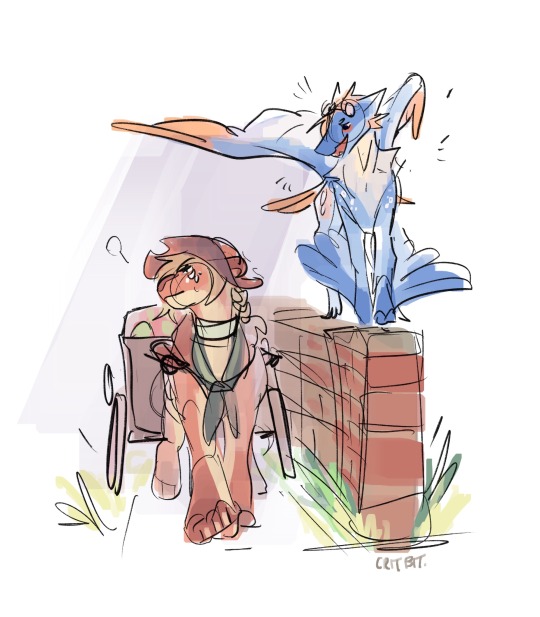
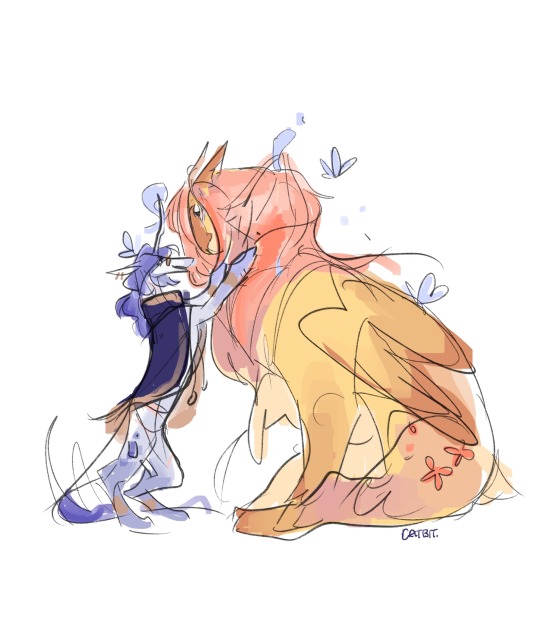
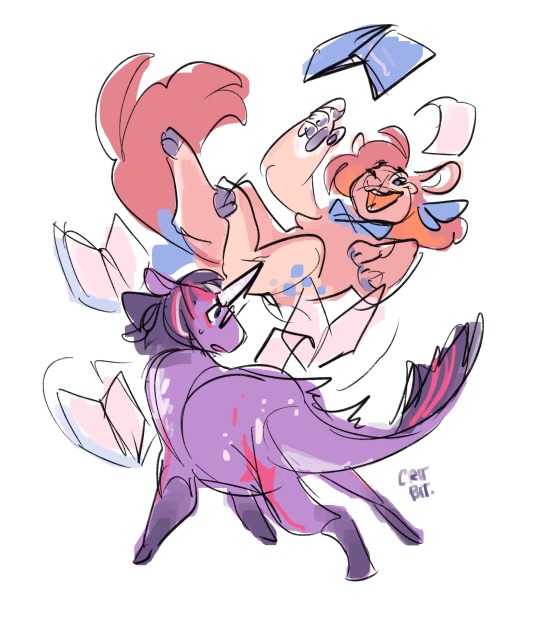
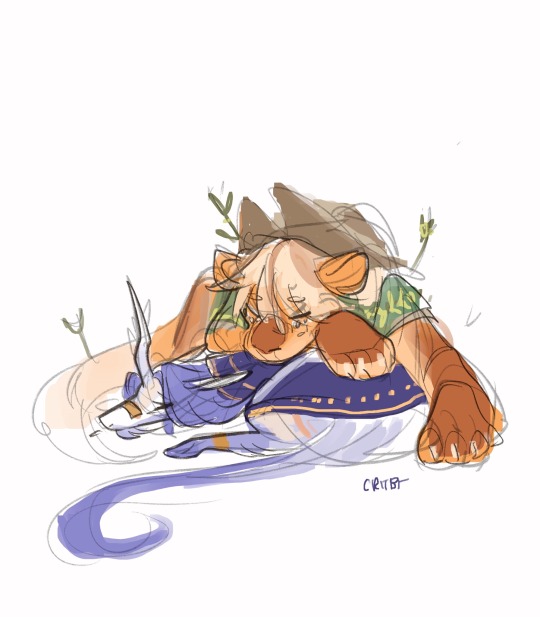
(I point. Gently, in the voice of somebody who’s mind touched by the outer gods, i whisper truth in your ears:
Your honor the horses are now lesbians
(Anyways here’s the designs)
#mlp#based off my mlp redesigns (no i will not be taking criticism)#mlp redesign#fluttershy is now a giant jacked carnivorous shire horse with anxiety#rarity is a trans queen and she’s carrying the plot on her back#applejack’s been bequeethed the oldest child syndrome after the traumatic death of her parents and learned to do taxes at the tender age of#13?? how do horses age#and rainbow dash is both loved and reviled by her pegasi foundry because she has ‘too much gryphon in her’#(but she FAST AS FUC BOI.)#anyways pinky’s my favorite. we don’t know whats up with pinky but she smiles a lot and the world distorts around her at exactly 1014 am.#twilight is celestia’s favored pupil prophet and is trying her best to figure out what the hell is up with pinkie and failing spectacularly#twilight also hatched a dragon from an inert stone and people have opinions about that#mostly ‘what are you feeding her’#(holds rarity and applejack) i think they’re neat together#they bond over growing up too quickly and have a vi-caitlynn thing goin on#(squints) didnt draw the cute mark crusaders but they’d be like. the batmen of the town. and it was fun and games until twilight heard#and gave them ACTUAL weapons#rarity#applejack#rainbow dash#twilight sparkle#fluttershy#pinkie pie#spike the dragon#I FORGOT SPIKE#spike’s a stone dragon that hatched from a stone egg. he is not meant to exist. he’s an elderitch horror and a baby boy and we love#and cherish his adorable little face#art#critdraws#Rest your Weary Hooves in our New Found Home
3K notes
·
View notes
Text
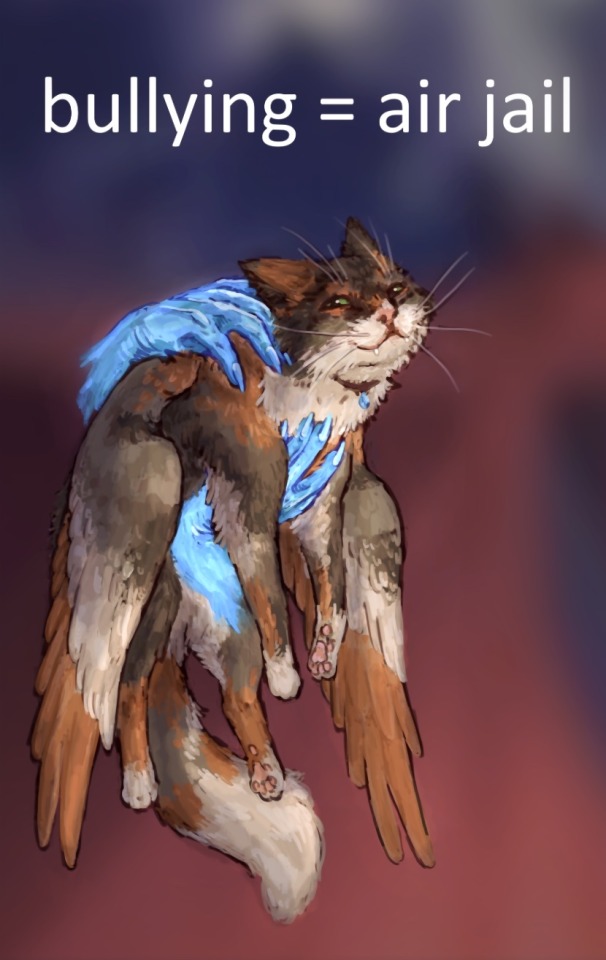
timeowt
pt. 1
#my art#surprising amount of people in favor of bullying Astarion#(she is counted in that group of course)#tara the tressym#bg3 tara#gale of waterdeep#(it’s his mage hand)#bg3 fanart#bg3
3K notes
·
View notes
Text
Let us be brutally honest with ourselves and with eachother for a moment. If he weren't obese you motherfuckers would be capable of percieving evrart claires sexy sexy moral ambiguity and complex charms
#i am (lesbian) sipping him like a fine DESSERT WINE#my evidence by the way is very simple and very damning. joyce messier. there i said it.#if you guys can appreciate the fact that Joyce is a complex figure worthy of disgust yes but also worthy of empathy#despite being a venal coward facilitating acts of violence and slaughter of the organized working poor of martinaise in the name of capital#if you can understand that she is a dimensional figure while also being an embodiment of the moral apathy and cruelty if capital owners#but you cant look at evrart and see that he is (while deeply flawed and morally suspect) also a dimensional figure#on top of the fact that his motivations are eminently relatable and dare i say it baser#and his greatest failing imho is in failing to advocate for the interests of *all* the poor of martinaise#opting instead to marginalize the inhabitants of the fishing village in favor of a power grab in the interests of himself and his union#though this is imo a bit of a grey area morally. undeniably a wrong and bad thing to do but done in service of clairs political goals#to gather power to advocate for the working class against ultraliberal monoliths like wild pines and fascistic orgs like krenel#still super wrong but i can follow the moral arithmetic there tho i don't like it#but like my point is if u can see that joyce is evil and pathetic but still cool and sexy but you consider clair flatly distasteful#thats cus hes not conventionally attractive#cus he is *every bit* as dimensional and interesting as joyce and he is not nearly as politically shite even if hes interpersonally a jerk
2K notes
·
View notes
Text
Do dulls




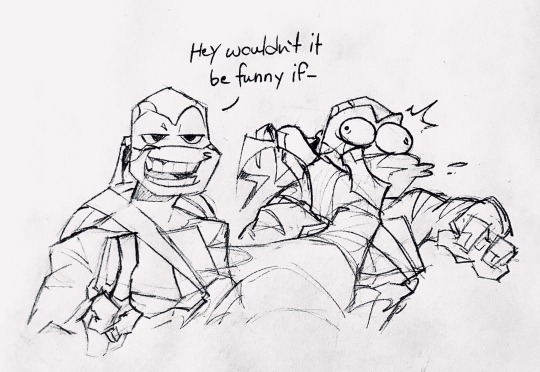
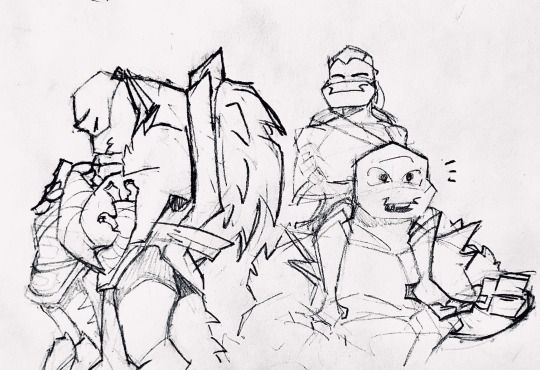


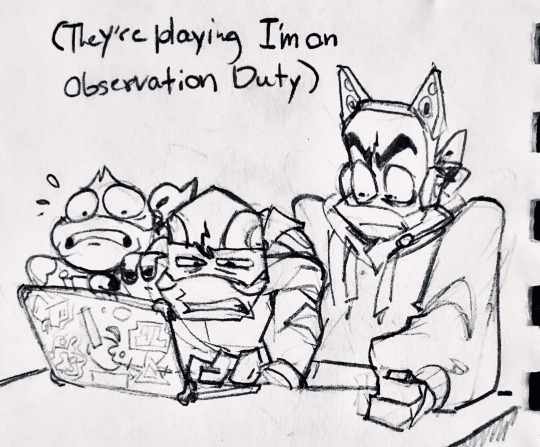
#Hey could you do me all a favor and ignore my spelling errors cool thank you 💖#art#my art#my artwork#sketch#sketches#sketch dump#fan art#fanart#rise of the teenage mutant ninja turtles#rise of the tmnt fanart#rise of the tmnt#rottmnt fan art#rottmnt
12K notes
·
View notes
Text
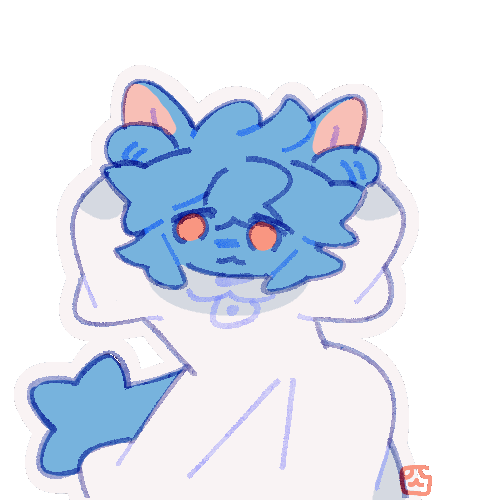
me when the laikas comet. is this anything
@laikascomet
#tumblr wont let me upload the audio file >:( do me a favor and put caramelldansen on in another tab#with any luck itll eventually sync to the music#i originally wanted to do this with Yue but his ears and coat are hard to animate so i decided to go with mars lol#maybe next time ill do laika leek spin...... Ievan Polka was one of my favorites as a kid#i just realized procreate dreams is already out but i dont have money so i just made this in regular ass procreate lol#i like how this turned out ^_^#my art#myart#fanart#laika's comet#laikas comet#mars#fur#furry art#gif#caramelldansen#edit: sped it up a little#flashing#flashing images
2K notes
·
View notes
Text
i love that canon nico's appearance is described as unnerving. percy says he has a glint in his eyes that makes you think he's either a genius or a madman. people comment about how his presence is eerie and how he just seems to show up, like a specter. his smile is said to be more unsettling than his scowl. pretty privilege nico is a fun hc but i just love the idea that he looks like some eldritch being at his worst and a sopping run-over black cat at his best.
#scary nico is my fav nico#also i like how my fav characters all described nico favorably at one point#reyna describes him as angelic when he's sleeping#apollo says his smile is like “the sun peeking through snow flurries”#and will is will solace i don't even have to explain that one#nico di angelo#nico di angelo pjo#nico di angelo headcanon#percy jackson#percy jackson and the olympians#pjo#heroes of olympus#hoo#toa#tsats#pjo hoo toa
3K notes
·
View notes
Text
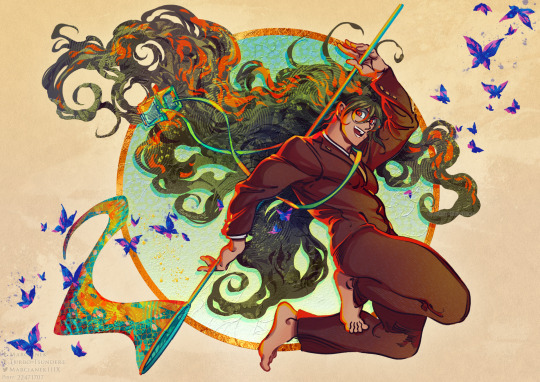
#gonta gokuhara#gokuhara gonta#danganronpa#v3#ndrv3#my art#first post of this year yey#it's a bit experimental and the idea kept changing along the way in favor of playing with brushes and patterns#but I'm glad I finished smth. it's been a while. maybe this finally marks the end of my typical seasonal artblock#my guy always saving me from my slumps xD
1K notes
·
View notes
Text
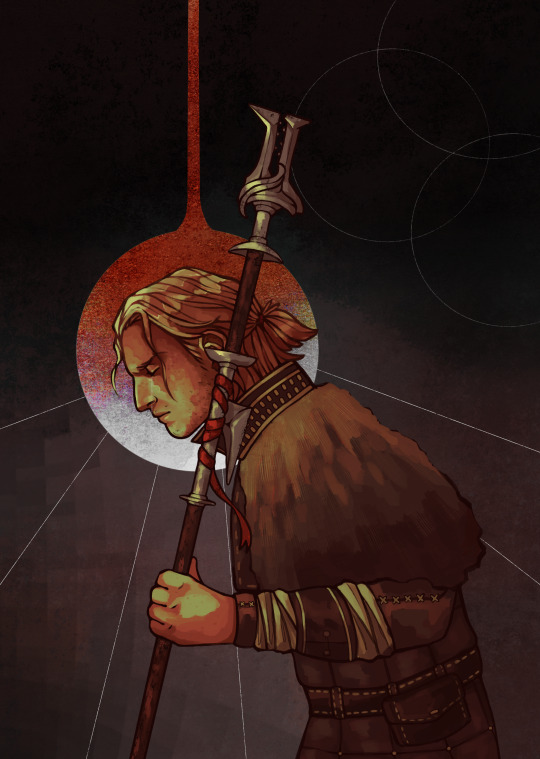
heavy is the head.
#my art#drawing dramatic anders fanart like its my 9-5#loosely inspired by da:i tarot art#dragon age#dragon age 2#anders#anders da2#anders dragon age#handers#implied once more by hawke's favor on his staff!!#digital painting
2K notes
·
View notes
Text
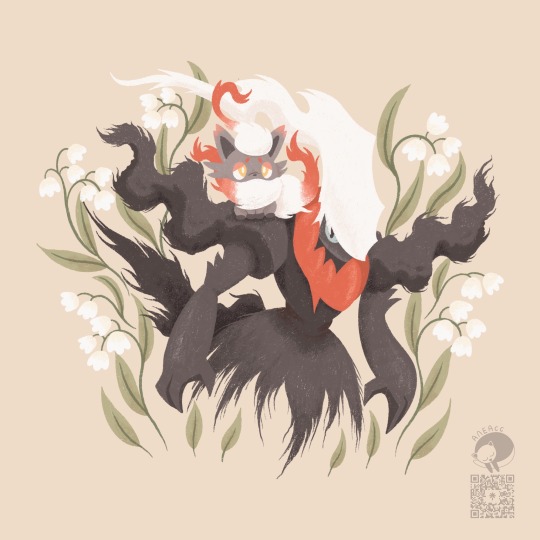
✨The baby and his bodyguard ✨
[Image description: digital art of the Pokemon Darkrai, floating with a Hisuian Zorua perched shyly on its shoulder. White flowers are growing around them. End ID.]
A cool and fun commission made for a dear friend of mine irl, they wanted their 2 fave pokemon together, surrounded by lilies of the valleys or blue bells, I choose the first, because it fitted better with the aesthetic
Sincerely, I’m so happy how this one turned out, I can see progress and it gives me joy 🥹
I still have some slots left for commissions at Ko-Fi
#darkrai#zorua#hisuian zorua#pokemon fanart#pokemon#pokemon drawing#aneacc#my art#fan art#artists on tumblr#procreate#edited with ID as a favor
2K notes
·
View notes
Text
Why Do People Like Yanderes?
Hi everyone, my name is Diya, and this was going to be a YT video-essay-type-thing but I'm too poor to afford a mic and too busy with college to learn how to edit videos, so here's my vague exploration of the psychology behind why people like yanderes so much through the lens of my favourite Visual Novels.
TW for uh. yandere content. Mentions of sex, gore, and non-con, particularly in the last topic. This is more like the first draft of an academic paper so while it's not explicit, I do go into some detail.
Introduction
If you’re a fan of anime or visual novels, then you’re probably already aware of what a yandere is, or at the very least you’ve seen that one picture of Yuno Gasai. Still, for the sake of thoroughness, let’s take it from the tippy top. The term ‘yandere’ is a Japanese portmanteau of ‘yanderu’ – the progressive form of ‘yami’ – meaning ‘sick’, and ‘deredere’ which roughly translates to ‘loving’. Together, the word refers to someone who is – in short – extremely lovesick. Obsessive to the extreme, and with little morality to spare, the standard yandere is characterized by a dangerous fixation on a chosen target, often appearing shy and caring at first only to flip the script and become violently aggressive towards perceived threats (Kroon, 2010).
It should be noted that yanderes are not a strictly romantic or sexual trope. The Ancient Greeks classified at least six forms of love, from familial (storge) to guests (xenia). Modern psychologists may distinguish love as either Companionate or Passionate (Kim & Hatfield, 2004) or consisting of three dimensions of Intimacy, Passion, and Commitment (Sternberg & Sternberg, 2018). Realistically, possessiveness shows up in a variety of relationships. However, people are generally primed to view certain dynamics as inherently amorous. Societal norms tend to encourage the idea that romantic bonds ought to rank above all others, and therefore if Person A is bizarrely fixated on Person B, then clearly there must be an element of sexual interest involved regardless of the actual relationship between the individuals in question.
Regardless, yanderes remain quite popular in fiction. Many dismiss it as a fetish, which it can be, but that isn’t the case for everyone. While there is nothing wrong with indulging in kinky fiction, not all of us get horny at the thought of being chained up in someone’s basement, no matter how hot our captor may be. So why is it so pervasive? Why is this trope so appealing that most writers cannot help but include at least a single line of dialogue implying that – if circumstances had been ever so slightly different – my wholesome shoujo romcom might have turned into a psychological horror?
Hybristophilia
‘Hybristophilia’, also known as Bonnie and Clyde Syndrome after the titular criminal couple, is a word is derived from the Greek word ‘hybridzein’ meaning ‘to commit an outrage against someone’ and ‘philo’ which means ‘a strong preference for’. Sexologist John Money reportedly defined it as a paraphilia in which an individual is sexually aroused by a partner who has a predatory history of hurting other people (Money, 1986, as cited in Matuszak, 2017). In his book, Serial Killer Groupies, true crime and crime fiction author RJ Parker distinguished two forms of hybristophilia: passive and aggressive. The former is when an individual contacts a criminal with the intention of striking up a relationship with them, allowing themselves to be seduced and manipulated but having no interest in committing a crime themselves. The latter are far more dangerous, as the individual not only derives sexual pleasure from their partner’s atrocities but are active participants in carrying out or covering up the crime. To quote Griffiths (2013, as cited in Pettigrew, 2019):
“[They] help out their lovers with their criminal agenda by luring victims, hiding bodies, covering crimes, or even committing crimes. They are attracted to their lovers because of their violent actions and want to receive love yet are unable to understand that their lovers are psychopaths who are manipulating them.”
In some ways, hybristophilia is the nearest thing we have to a realistic understanding of why people love yanderes. I mean, much of the fantasy surrounding such characters and their media tend to be filled with posts begging to be spat on or calling the rightfully terrified main character ungrateful for being a teeny bit upset about finding surveillance cameras in their ceiling. However, enjoying fictitious immoral activity does not predict real perpetration, so what does? There exists little consensus amongst psychologists as to what sparks this particular predilection, and that was strange to me. You would think there would be more studies into this topic, in spite of or perhaps because of its controversial nature. Heck, that one dude wouldn’t shut up about white women’s obsession with Bundy and Dahmer, and I assumed he had gotten that information from somewhere, but it turns out that was just him using modifiers to justify sexism.
However, I believe that we can hedge a few guesses, and over the course of my research, I’ve organized the main rationalizations under four umbrellas which I will explore through the lens of my favourite yandere-themed Visual Novels. Please keep in mind that most of these games are rated as mature due to sexual scenes and/or gore. Additionally, in the spirit of transparency, this ramble will be focused exclusively on male or masculine yanderes. So, without further ado:
Call Me Bob the Builder Because I Can Fix Them
If you’re familiar with DC Comic’s Batman, or just happen to have attended any costume event held over the span of the last 20+ years, you may be familiar with the character of Dr. Harleen Quinzel, better known as Harley Quinn. Initially created as the Joker’s one-off sidekick in Batman The Animated Series, she was so well-received by audiences that she became a recurring character in the cartoon and was eventually given a proper origin story in the form of a one-shot titled Mad Love.
Harley’s origin story has seen some alterations over the past decades, but the core aspects remain largely untouched. In the beginning, Harleen Quinzel was a promising young woman who wanted was a degree from the university’s prestigious psychology department, which she gained through…less than scrupulous means.
(Listen, I’m not sure if the authors were leaning on the Dumb Blonde stereotype, or if they simply thought that casting her as a genuinely bad student would make her later actions more believable. Either way, the idea of Harley as someone with a legitimate PhD came later)
After landing an internship at Arkham Asylum – a half-hospital and half-prison straight out of the 1870s that might as well be built out of one-ply tissue-paper soaked with gasoline and left next to a crate of fireworks – Harleen set her sights on the then incarcerated Joker. At the start, her fixation on the criminal wasn’t remotely sympathetic. She didn’t want to help him, she wanted to use him. Harleen Quinzel wanted piggyback off his infamy and write a tell-all tale detailing what sort of messed up childhood resulted in Gotham’s Clown Prince of Crime. Yet the more she interacted with him, the more the Joker took advantage of her empathy. By the end of their sessions, Harley no longer saw him as a violent serial killer with a clown schtick, but as a “lost, injured child looking to make the world laugh at his antics.”
But Diya, you may be asking, what does this have to do with the video? The Joker never loved Harley, and it could even be argued – as Shehadeh did in a 2017 essay – that her obsession with the pasty-faced clown is more akin to Histrionic Personality Disorder. While that may be the case, I believe that Harley’s story provides one of the reasons yanderes are so popular: their backstory.
Whether they were abandoned by their family, bullied by their peers, experimented on by evil scientists, starved on the streets, died under mysterious circumstances and then trapped in a haunted VCR tape for decades, or are simply so impossibly inhuman that they frankly do not understand why it isn’t socially acceptable to imprison their crush in a pocket dimension made of meat and non-Euclidean geometry, yanderes often have fairly sympathetic or at least understandable explanations for why they are Like That. Your mileage may vary significantly depending on how much you sympathize with these motives, but the point is that yanderes always make sense to some degree. Their morality and priorities may be twisted or even completely incomprehensible, but the audience almost always knows the reason, and that can be comforting. In the real world, other people aren’t always straightforward, and we never really know what they’re thinking, but narrative coherence demands a semblance of internal consistency lest the audience end up frustrated and confused. So yanderes are not only easy to sympathize with, but also fairly predictable. In-universe they may be unhinged freaks with a blood fetish, but to you watching from behind the safety of the screen they’re just acting out the script written for them based on a prototype. And if you understand the why behind their loose gears, then you might just be able to put them back together again.
The concept of rescue romances or “I Can Fix Them” has been around in our stories for thousands of years. The Epic of Gilgamesh detailed how Shamhat essentially ‘civilized’ wild man Enkidu through ritual lovemaking, and a concerning number of religions push the idea that women are dutybound to save men from the follies of sin. Yet men are not exempt either, with one notable example being the German fairytale, King Thrushbeard. Call it what you will regardless: Knights in Shining Armour, the Florence Nightingale Effect, or a plain old case of Because You Were Nice to Me, studies have shown that human beings generally like helping [DA2] others, even when the reason doesn’t necessarily stem from pure altruism. I will delve deeper into this later, but care and compassion are deeply ingrained in human nature, and arising from those roots is the appeal of this mentality: You can save them. You can change them. You can make them better. You are special, and the way you treat this person carries a weight that has not and will never be matched by anyone else for the rest of their mortal or immortal existence.
The illusion is a delicious one, especially if the person you’ve helped turns out to be a billionaire CEO with cash to burn, a super powerful ghost king willing to raze continents to dust for you, a demon having fun on a Friday night, or just your average hot creep with a knife. Moreover, different people have different ideas of what ‘fixing’ even means. Maybe you want to single-handedly rehabilitate your yandere into a functional member of society. Maybe you’re cool with the incessant stalking but would like them to stop slaughtering your friends, family, and local service workers. Maybe you want to make them much, much worse.
Not only do yanderes provide immediate proof that your actions have a tangible impact on the lives of others, but the fantasy also includes the desire of being seen as special. Of being admired and adored by someone whose life you inexplicably made better by virtue of simply being yourself, or an idealized version of yourself. In this fictional world, in this imaginary setting, the person you are is so uniquely, impossibly irreplaceable to someone. And if that’s the case then they can’t risk losing you, can they?
The Allure of Obsession, or ‘Til Death Do Us Part (Literally)
It shouldn’t be necessary, but here is my obligatory disclaimer anyway. Ahem: obsession is not a good thing in real life. Fixating on another human to the detriment of your own wellbeing and that of those around you is dangerous, as is encouraging someone else to obsess over you. You might think you are being worshiped, but real life is not a visual novel. The outside world doesn’t come with an age rating, the author’s guiding pen, and a convenient fade to credits sequence once you’ve reached an ending. The consequences will still be there in the morning, so don’t do it. Just don’t.
PSA out of the way, it’s natural to want to be wanted. Maslow’s Hierarchy places it just above physical safety, but I’d argue that it could easily be compared to baser drives. According to many psychological and anthropological studies, much of humanity’s continued survival and environmental dominance is largely attributed to our ability to form groups, cooperate with one another, and maintain complex interpersonal networks. Social support, intimacy, and a sense of belonging are linked to emotional and physical benefits, such as more optimistic health perceptions, higher subjective well-being, increased creativity and innovation, and greater self-efficacy (DeWall & Bushman, 2011; Harandi et al., 2017; Wang & Sha, 2018). Therefore, it’s perfectly understandable that rejection of any sort would be construed as a threat.
But if someone is obsessed with you, then you have no reason to worry about that, right? No more nights spent agonizing over how they feel about you, asking yourself whether your last text made you sound too desperate, or if you’re boring them because you spent the past hour info-dumping about Stardew Valley farm layouts. With a yandere, there will never be any doubt that they care about you. Sure, they might go about it in weird, manipulative, and insidious ways that violate your physical and mental autonomy, but you can’t deny their loyalty. They do love you in their own bizarre way. You are the sun around which they orbit. When you’re in the room, no one else exists. Every single messy flaw is just another bullet point on the mile-long list of why they adore you.
In essence, yanderes are not only attentive, but their love can be virtually unconditional. A yandere might know everything about you, and still revere you. It’s unhealthy as hell and you might genuinely question their taste, but it can be tempting to pretend that all of you, right down to the ugliest parts of yourself – the traits and choices that you would never share with another living soul even at gunpoint – are worthy of understanding, if not open praise and affection.
Attractiveness, or Okay but Have You Considered That They’re Hot Though?
.
.
.
I mean what am I supposed to say here? They’re hot, what do you want from me?
No, but in all seriousness, fictional media paints an idealized version of the world, and most yanderes are hot because they have the freedom of existing purely behind that screen; artfully arranged and edited to forever appear compelling to anyone who happens to enjoy their particular style. And there are a lot of styles to choose from. Whether you want them pretty faced and disarmingly cute, or scarred up and big enough to pin you like a butterfly, yanderes come in a wide variety of shapes and sizes that are meant to pique your interest and draw you in like a naïve little fish being lured towards the mouth of an angler fish, unwilling to believe that anything bad might happen to us when the bait is this pretty.
This is often referred to as the Halo Effect, a form of cognitive bias referring to the tendency for people to assume that a single obvious positive trait must be associated with other positive traits. The go-to characteristic is typically physical attractiveness, but a nice voice, good humour, and cooking skills are also factors which serve to influence our perceptions.
So, conventional physical attractiveness is one thing, but that’s only skin deep. What about beyond that? After all, the yandere still has to talk to you before they enact their master plan of tying you up in their basement until Stockholm Syndrome kicks in.
When I showed my friend a picture of John Doe from the game John Doe, she told me that he looked like a creepy slob, and she’s far from the only person who’s ever thought so. Look at them. I feel like if I tried to comb that hair it would simply eat me, and some of the CGs really put the scopophobia in Scopophobia Studios. I love Doe, but he is not hot, and he doesn’t behave in a normally appealing way either. If the player chooses not to take a bath, Doe will immediately comment that you “smell good” before following you home, breaking into your house, and leaving a bloody organ on the floor for the player to trip over. Many yanderes can at least fake a veneer of normalcy, but from the get-go Doe doesn’t even bother to pretend he’s anything less than an otherworldly creature stuffed into a vaguely person-shaped meatsuit. In an effort to find out why so many people had latched on to Doe – including me – I shopped around social media and YouTube for answers, and what I found was a widely unanimous sentiment.
While some were drawn to his fun design and goofy personality, most simply thought that he wasn’t inherently malevolent, just very confused. In addition to being a supernatural being with a completely alien axis of morality, Doe’s meta-awareness and unbridled attempts at winning the player’s affection lends him quite a bit of support from the audience, especially if you yourself also happen to struggle with social cues and relate to his pure earnestness. In Ending 7 of the extended version, the player character has the option to tell Doe – who has altered himself to pass as more ‘normal’ – that they prefer who he truly is, at which point he grows visibly flustered and sports an adorable pair of literal heart-shaped pupils.
Whether they’re charismatic, seductive, cute, sweet, funny, nurturing, or generous, the best yanderes have engaging personalities. Even while they’re committing truly heinous crimes against God, man, and your guts, you still kinda want to hang out with them, and you want them to acknowledge you as being just as interesting. And this is all fine in fiction because you’re the one in charge, and if you ever get bored or uncomfortable or busy with something else, then you can simply close the tab or window with zero consequences, which brings us to the final and most important reason.
Power Dynamics and Consent in Fantasy (I Couldn’t Think of a Joke Here Guys, This Is Kinda Serious)
Once again, I feel that I must preface this section just for the sake of my own peace of mind: sexual coercion and assault are vile and disgusting crimes that should never be emulated or tolerated in the real world. We are speaking purely of fictional media, specifically adult-oriented media in this case, so please be mindful.
In 2009, Bivoni and Critelli conducted a study on 355 undergraduate women with the goal of assessing the reasons behind fantasies of non-consent. At the time, there were two leading explanations of this phenomenon. One stated that women with high libidos but repressed views of sex used these imaginary scenarios to alleviate the guilt they had grown to associate with sex. Because the simulation was a purely mental exercise and they themselves were cast as helpless victims in the scenario, they were able to remain blameless while still finding sexual gratification. The second stated that these fantasies were an expression of liberation by women who were adventurous and comfortable enough with their own sexuality to engage with taboo ideas that they weren’t at all interested in performing in real life. Which do you think was more common?
.
.
.
If you guessed the second option, you’d be right. The study found that of the 220 women who had experienced such fantasies, 45% found theirs erotic, 46% were mixed, and only 9% reported pure aversion. One justification for this outcome relies on psycho-biological theories, for example masochistic preferences or the unintended activation of the sympathetic nervous system and subsequent mis-attribution of arousal. Other reasons have to do with higher order thinking and are tied to the power dynamics within such fantasies. On the surface is the appeal of being so desirable to someone that they simply cannot control themselves, but then there is a deeper impulse, which the researchers referred to as Adversary Transformation. To quote the article: “[fantasies] involve a struggle between an assailant and a potential victim in which it is relevant to consider who is the winner and who is the loser. At one level, it is a struggle over sex, but the woman's non-consent may be feigned or token. At another level, the woman may be seeking a victory that is not about whether sex occurs, but about what happens emotionally between the protagonists.”
Basically, the imaginary perpetrator may have ‘won’, but the self-character need not have ‘lost’.
Media provides an extra layer to the illusion, one that you as the viewer have absolute control over. If you are choosing to engage with a piece of media that explicitly labels itself as including R18+ yandere content, then you clearly have some expectations, and that background awareness goes a long way in reducing long-term discomfort and allowing audiences to make informed decisions. If you don’t like the plot, you can simply turn it off it with the click of a button, and when the screen goes dark it’s not like the yandere is going to punish you for saying no. Strade isn’t going to break into your house with a drill, there are no homicidal clown ghosts hiding in your TV, and no suspicious pink-haired hackers watching your webcam. They aren’t real, and the consequences aren’t real either. You have all the power here.
Conclusion
In summary, Yanderes are appealing for a variety of reasons. Whether you want to save them, think they’re attractive, wish to indulge in a dream of being utterly coveted, or simply enjoy a bit of spice in your me-time, it’s obvious why the trope has persisted for so long and will likely continue to do so. If you enjoy yanderes but are worried that having a taste for the less wholesome side of things might imply something about who you are as a person, don’t be. The notion that fantasies and media preferences directly reflect subconscious desires is not only painfully out of date debunked nonsense but also indicative of restrictive ideologies wherein bad thoughts = sin. This isn’t 1984. You haven’t committed a thought-crime by having a weird kink. You aren't going to superhell for fantasizing. The human mind is hardly ever so mathematically rational, and the point of fiction is to allow us to safely engage with and explore various ideas, provided the everyone involved is mentally, chronologically, and emotionally mature enough to do so.
Thank you all for listening to me. If you learned something or were just a little bit entertained. If you're curious about knowing more, I've listed my sources below
REFERENCES
Bivona, J. M., & Critelli, J. W. (2009). The Nature of Women’s Rape Fantasies: An analysis of prevalence, frequency, and contents. Journal of Sex Research, 46(1), 33–45. https://doi.org/10.1080/00224490802624406
Critelli, J. W., & Bivona, J. M. (2008). Women’s Erotic Rape Fantasies: An Evaluation of Theory and research. Journal of Sex Research, 45(1), 57–70. https://doi.org/10.1080/00224490701808191
DeWall, C. N., & Bushman, B. J. (2011). Social acceptance and rejection. Current Directions in Psychological Science, 20(4), 256–260. https://doi.org/10.1177/0963721411417545
Flynn, F. J., Reagans, R., Amanatullah, E. T., & Ames, D. R. (2006). Helping one’s way to the top: Self-monitors achieve status by helping others and knowing who helps whom. Journal of Personality and Social Psychology, 91(6), 1123–1137. https://doi.org/10.1037/0022-3514.91.6.1123
Harandi, T. F., Taghinasab, M. M., & Nayeri, T. D. (2017). The correlation of social support with mental health: A meta-analysis. Electronic Physician, 9(9), 5212–5222. https://doi.org/10.19082/5212
Hazen, H. (1983). Endless rapture: rape, romance, and the female imagination. https://openlibrary.org/books/OL3161300M/Endless_rapture
Kroon, R. W. (2010). A/V A to z: An Encyclopedic Dictionary of Media, Entertainment and Other Audiovisual Terms. McFarland.
Matuszak, M. (2017). Hybristophilia White Paper. https://static1.squarespace.com/static/55dfd21ee4b0718764fb34cc/t/5cb7cabee5e5f00ab13be58b/1555548863275/Hybristophilia+White+Paper.pdf
Oarga, C., Stavrova, O., & Fetchenhauer, D. (2015). When and why is helping others good for well-being? The role of belief in reciprocity and conformity to society’s expectations. European Journal of Social Psychology, 45(2), 242–254. https://doi.org/10.1002/ejsp.2092
Parker, R. (2014). Serial killer groupies. RJ PARKER PUBLISHING, INC.
Wang, T., & Sha, H. (2018). The influence of social rejection on cognitive control. Psychology, 09(7), 1707–1719. https://doi.org/10.4236/psych.2018.97101
#reference list is completed!#yandere#sunny day jack#my dear hatchet man#mdhm#stnaf#ddlc#john doe#boyfriend to death#tpof#degrees of lewdity#your boyfriend#14dwy#br<3ken colors#camp willowpeak#br0ken colors#obey me#binary star hero#favor vn
2K notes
·
View notes
Text
777 - luck and good fortune

good things are coming,
no matter how much you worry,
they will arrive.
#lucky girl affirmations#lucky girl syndrome#girljournal#girlblogger#girl blogging#self care#self love#dream girl#moodboard#pink blog#affirmations#law of attraction#girl blogger#pink blogger#pinkcore#everything works out in my favor#greatful#hell is a teenage girl#glittrluckee#777#angel number 777#manifesation#loa#pick a card#pac#tarot#tarotblr#astrology
1K notes
·
View notes